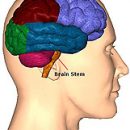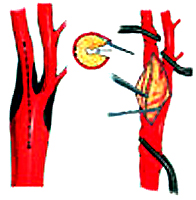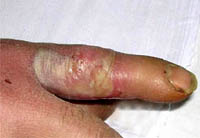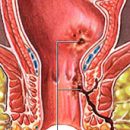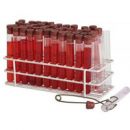Anesthesia: fear or not?
«How I suffered anesthesia?» - The answer to this question worries anyone who is going to surgery. And, as it turned out, it is completely no coincidence: in most hospitals world standards safe anesthesia do not work. But they exist.
Content
Inhalation anesthesia is better
 In industrialized countries, the main proportion of anesthesia is carried out using inhalation anesthetics. The main advantages of such anesthesia are associated with the features of the action of drugs used in this case, which, with minimal impact on the internal organs, provide controlled and well-managed anesthesia.
In industrialized countries, the main proportion of anesthesia is carried out using inhalation anesthetics. The main advantages of such anesthesia are associated with the features of the action of drugs used in this case, which, with minimal impact on the internal organs, provide controlled and well-managed anesthesia.
The use of inhalation anesthetics eliminates or significantly reduces the need to use complex combinations of potent pharmacological agents characteristic of intravenous anesthesia, which is actually not so good as it seems. The fact is that many practicing her clinics use drugs that are well shiering, but poorly painted.
Others add drugs to them, after which a few hours remain disorders of consciousness, attention, thinking. For doctors, this state of affairs has become a sad way: insurance companies are not interested in the use of modern types of anesthesia, since they increase the cost of treatment, which is not enough money to budget hospitals.
Risk zone
However, in virtually all anesthetics damage to one degree or another. As a result of their application, part of neurons die. And although in most cases this process is not fatal, it is with a general anesthesia that specialists often associate a violation of cognitive functions.
There are data indicating and more serious consequences of anesthesia. And although, according to statistics, the probability of die from anesthesia is only 1 per 200 thousand planned operations and is comparable to the probability that the brick will accidentally fall on the head, the risk to die for a year after the transferred operation exists. At the same time, the deeper the anesthesia, the one is higher. Such a pattern revealed a study of American scientists, conducted among tens of thousands of patients who have undergone operations. What it is connected is unknown.
It is impossible to discount and individual reaction to one or another type of anesthesia, as well as the presence of related diseases, which the doctor may not suspect. Especially when it comes to small in terms of operational or diagnostic medical manipulations (gastroscopy, colonoscopy, diagnostic scraping), requiring anesthesia. According to experts, sometimes a person is intentionally says nothing about his problems on the eve of the operation, if only he did not refuse to anesthesia, risking to lose health.
Dangerous awakening
Problems can be associated not only with a weak equipment of the hospital, poor anesthesia quality and adequacy of a doctor about patient's sores on the operating table, but also with the lack of due control over its condition during general anesthesia. What is fraught with the development of another unpleasant complication: during the operation, a person can simply not wake up.
According to statistics, with inhalation anesthesia, it happens in 1% of cases, with anesthesia, nitrogen can reach 20% when using ketamine – 25. Only in the United States every year this complication develops approximately 20,000-40,000 patients with surgical profile. Around each third of these patients, the restoration of consciousness is accompanied by painful sensations, there are no other pains, but there is a sense of discomfort, fear and even panic. This state is dangerous by what is affected by the quality of life: develops posttessor syndrome, which has already been proven, is responsible for the development of a plurality of postoperative complications, including infarction, strokes and disorders of the gastrointestinal tract that may develop when everything already seemed would have ended safely.
This problem is known for a long time, but only in recent years, when it began to be discussed in the media and state and public organizations have connected to her decision, the first real success appeared in her decision. So, in the United States after a series of high-profile cases related to uncontrolled awakening during surgery, 70% of the operating and most resuscitation chambers have equipped with monitors of the anesthesia depth, allowing to select the desired dose of drugs of drugs and reduce the probability of waking up to 0.002%. In our country, such a luxury is available only to patients of leading medical centers.
by the way
After talking with doctors, we made a memo about what a person should know, which is solved on a planned operation under general anesthesia:
- Before you go to the operating table, ask the anesthesiologist, is there a modern inhalation and intravenous anesthesia in the clinic, whether there are various regional blockages in it with the preservation of consciousness and without. If there is no such capabilities of the clinic, but uses old anesthesia techniques in his work, there is a reason to think. Of course, in a similar way, not one generation of patients was anesthetized. But why expose yourself although minimal, but risk? Need to choose the best;
- Another useful question, the answer to which is desirable to get before stopping the choice on a specific clinic, — about the technical equipment of the operating. It is not even a drug for safety to a greater extent, but the place of the anesthesiologist's work is organized. It would be nice to ask if there is oxygen, a pulse control monitor, pressure, breathing, and ideally — and monitor control of the depth of anesthesia. If not, it is better to rebuild and search for another place. And even more so do not agree on the option when an anesthesiologist having a couple of syringes with medicine and a tonometer is invited to an endoscopic, dental or procedural study. An exception — Emergency situations. In this case, it is not necessary to rush in search of a super-modern drug and demand from a doctor to apply it. Best view «urgent» Narcosis — the one that anesthesiologist enjoys daily and which is best. So far only one anesthesia is considered harmless — xenon. This inert gas does not enter into any chemical interactions and does not cause damage to neurons — This has been proven by various scientific research.

